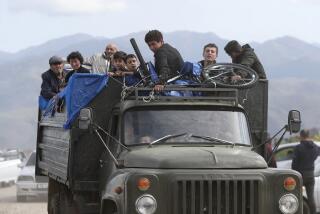CAUCACUS : Embattled Azerbaijan Struggles to Muster a Sense of Urgency
- Share via
BAKU, Azerbaijan — It took a week to settle the hours of the curfew. The censorship issue took even longer. As for a ban on demonstrations, that seemed to depend more on opposition compliance and public despair than any firm action of the war-humbled Azerbaijani government.
If there ever was a state of emergency lacking a sense of urgency, it is the 60-day period declared early this month. Yet President Abulfez Elchibey is struggling to re-establish authority and to mobilize his people to reverse this month’s huge loss of Azerbaijani territory to Armenian forces.
True, the streets here do empty at night, checkpoints in the city have been reinforced to search for guns and deserters and television screens are filled with rousing film of young Azerbaijani soldiers at the front. But such is the confusion in this Caucasus nation that even in these darkest days of its independence from Moscow, political unity remains elusive.
“The government just does not work,” Etibar Mamedov, 38, the principal opposition leader, said in an interview in his headquarters in an old Communist Party building outside Baku. “I’ve offered to join a genuine coalition government until there can be new parliamentary elections, but there’s been no response so far.”
Fortunately for Elchibey, who led the nationalist fight for independence with Mamedov in the once all-powerful Popular Front, anger and frustration among the 7 million Azerbaijanis have no real direction. By day, the shop-filled boulevards of this turn-of-the-century oil-boom town bustle with activity. Unlike last year, when the former Communist rulers were overthrown, there is as yet no viable alternative to Elchibey’s democratically elected leadership.
“I curse them one and all,” said a refrigerator factory chauffeur, moonlighting as a taxi driver in his chief’s black limousine. “What we need is unity. They say they want unity but they do nothing about it whatsoever.” A chic office secretary added that some people even wanted a return to the old days of firm rule from Moscow.
Such talk makes the Azerbaijani leadership suspicious, especially since Russia, which has been mediating peace negotiations between Azerbaijan and Armenia, announced a cease-fire last week that the Defense Ministry in Baku said it knew nothing about.
Azerbaijan believes Russia is plotting to force it to accept the return of strong Russian influence and border troops.
“This all happened because we wanted freedom. We must create a special spirit to defend it,” Elchibey, 54, a former teacher, told locals during his tour of the front lines, for which he donned a military uniform and a baseball cap.
In the short term, the opposition, which has complied with the ban on demonstrations, has decided not to rock the boat too hard. The government has received a message of support from Geidar Aliyev, the nation’s former Communist leader. He ruled with an iron hand, and, despite his nearly 70 years, is still regarded by many as a strongman who could save the country.
Elchibey also has won international support from the United Nations and the United States, which have condemned Armenia for its latest incursion.
State television here leaves little doubt that Azerbaijan wants to build the capacity to launch a counteroffensive to reconquer the 60-mile-wide belt of Azerbaijan now linking Nagorno-Karabakh to Armenia. But the army’s disparate battalions of new recruits, local militia and police are poorly trained, ill coordinated and lack a martial spirit. Officers complain that the equipment they inherited from the departing Soviet force, most of it made up of Russian troops, was quietly sabotaged.
Weakness, disorganization and defeat have fed on each other since 1988, when the Armenians in the then-Azerbaijani-controlled enclave of Nagorno-Karabakh began battling for self-rule. One Western diplomat said that for the time being, “it’s more a question of where the Armenians are going to stop than what the Azerbaijanis can do.”
More to Read
Sign up for Essential California
The most important California stories and recommendations in your inbox every morning.
You may occasionally receive promotional content from the Los Angeles Times.













